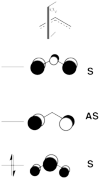Différences entre les versions de « VBTutorial2 »
Aller à la navigation
Aller à la recherche
VB applications on PI systems
| Ligne 50 : | Ligne 50 : | ||
== Exercice 3 : Radical caracter of ozone == | == Exercice 3 : Radical caracter of ozone == | ||
| + | # What is the complete basis of VB structure for the ozone molecule ? | ||
Version du 27 mai 2012 à 04:31
How to modify this page :
- first : log in (top right of this page) ;
- click on [edit] (far right) to edit a section of the page ;
- write your text directly in the wiki page, and click on the "Save page" button (bottom left) to save your modifications
Pictures : how to insert a picture in your text
See also this page for an introduction to the basics of the wiki syntax
To the Tutors
Sason remarks and prospective 2 hours talk +
Philippe's remark on the initially proposed tutorial. are included in bold.
Qualitative
- Exercices from The Book ... >PCH< (30')
Computational
- Allyl cation : VB 3 configuration (3rd configuration has a large weight).
- Benzene : question about basis of covelent structures (paper exercise, then xmvb zith str=cov), then all ionics.
- Ozone : paper exercise ; expand MO wf in VB basis, wieghts of biradical with HF, compute with XMVB (VBSCF, BOVB)
- Benzyl radical with most spin alternant determinants (2 determinants) (p228 of The Book) show spin location. Objection : this uses Heisenberg spin hamiltonian theory, a topic that we do not teach.
(trash: * O2 paradigm : compute singlet - triplet gap : too hard
- H2O lone pairs : compute H2O+ states (2 configurations mixing) Objection : did you try to do that ? If we let the orbitals optimize themselves, I guess we will converge to the MO solution with weight 1.0, the other structure with weigt 0.0. The H2O+ states would better be done as qualitative exercises.)
Exercices
Exercice 1 : The allyl radical and cation
Subject
Here is a image example
Th
To do
Access to files :
Exercice 2 : Resonance energy of Benzene
Exercice 3 : Radical caracter of ozone
- What is the complete basis of VB structure for the ozone molecule ?
